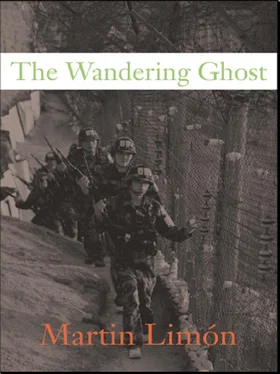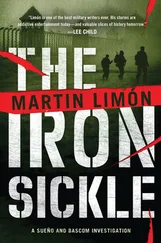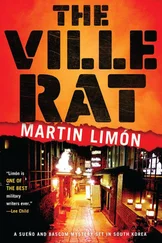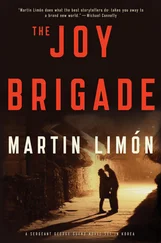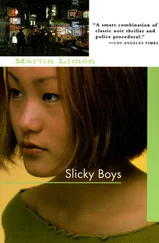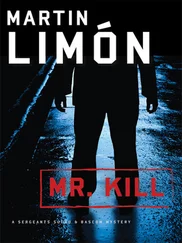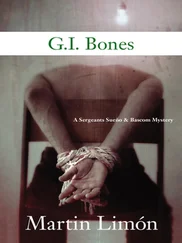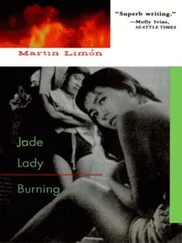Martin Limon - The Wandering Ghost
Здесь есть возможность читать онлайн «Martin Limon - The Wandering Ghost» весь текст электронной книги совершенно бесплатно (целиком полную версию без сокращений). В некоторых случаях можно слушать аудио, скачать через торрент в формате fb2 и присутствует краткое содержание. Жанр: Полицейский детектив, на английском языке. Описание произведения, (предисловие) а так же отзывы посетителей доступны на портале библиотеки ЛибКат.
- Название:The Wandering Ghost
- Автор:
- Жанр:
- Год:неизвестен
- ISBN:нет данных
- Рейтинг книги:4 / 5. Голосов: 1
-
Избранное:Добавить в избранное
- Отзывы:
-
Ваша оценка:
- 80
- 1
- 2
- 3
- 4
- 5
The Wandering Ghost: краткое содержание, описание и аннотация
Предлагаем к чтению аннотацию, описание, краткое содержание или предисловие (зависит от того, что написал сам автор книги «The Wandering Ghost»). Если вы не нашли необходимую информацию о книге — напишите в комментариях, мы постараемся отыскать её.
The Wandering Ghost — читать онлайн бесплатно полную книгу (весь текст) целиком
Ниже представлен текст книги, разбитый по страницам. Система сохранения места последней прочитанной страницы, позволяет с удобством читать онлайн бесплатно книгу «The Wandering Ghost», без необходимости каждый раз заново искать на чём Вы остановились. Поставьте закладку, и сможете в любой момент перейти на страницу, на которой закончили чтение.
Интервал:
Закладка:
It was followed by three Chinese characters: tong for east, du for bean, and chon for river. Tongduchon. East Bean River. Welcome to Tongduchon. Or TDC as the GIs loved to call it.
For a young American GI, the bar district in Tongduchon is the French Riviera, Las Vegas, and Disneyland all rolled into one. It’s brightly lit and there’s bar after bar and nightclub after nightclub and hundreds of young women parading around in various stages of undress. A bottle of Oriental Brewery Beer costs 200 won, about forty cents, and a shot of black-market bourbon costs 250 won. An “overnight,” an evening with a beauteous lady, costs anywhere from ten to twenty-five dollars, depending on a few variables: her pulchritude, your willingness to spend, and how close it is to the end-of-month military payday.
Night had fallen. Therefore, Ernie and I had changed out of our coats and ties and were now wearing our “running-the-ville” outfits: nylon jackets with fire-breathing dragons embroidered on the back, blue jeans, sneakers, and broad, mindless grins on our smoothly shaven faces. We may have looked like a couple of idiots wasting our money in a GI village that’s designed to do nothing else but separate a GI from his pay, but actually we were conserving the twelve bucks a day in travel per diem 8th Army authorized. We were tailing an armed military police patrol.
The patrol was composed of three men: a U.S. Army military policeman; a honbyong, an ROK Army military policeman; and a KNP, an officer of the Korean National Police. The reason for its odd composition was that the mayor of Tongduchon and the commander of the 2nd Infantry Division wanted to ensure that all jurisdictions were covered. Whether any given miscreant was an American GI, a Korean soldier, or a Korean civilian, one of the triumvirate of law enforcement officers would have the authority to arrest him. Or her.
The patrol wound through a vast labyrinth of narrow alleys filled with flashing neon and jostling crowds and rock music blaring from vibrating speakers. They entered bar after bar, checking out the American GIs and shoving through small seas of scantily clad Korean business girls. Usually, they were greeted and bowed to by an elderly female hostess. More often than not, she wore a brightly colored chima-chogori, the traditional Korean skirt and blouse. These women were the mama-sans, the older sisters to the business girls, the moms to the American GIs, the managers of all operations in the nightclubs for the absentee bar owners. These women wore their black hair formally, knotted high atop their heads and held together with jade pins, and often they wore earplugs, so they wouldn’t go deaf listening to the obnoxious American rock music pulsating out of enormous stereo speakers.
The ville patrol paraded into each nightclub like a pack of young kings. They searched not only the environs of the nightclub but also the areas behind the bar and the back storerooms and particularly the bathrooms, both women’s and men’s. If everything seemed to be in order-there were no fights, no drugs being dealt, nobody passed out-they departed and marched to the next bar. Ville patrol was the job Jill Matthewson had done. For years- probably since the Korean War ended in 1953-the ville patrol had consisted of three policemen. Adding Jill was an innovation. She became the fourth member of the team. Since American women had first been assigned up here to Division, a few of them complained about Korean cops barging into ladies’ rooms and checking the stalls, with them in it! So the Division provost marshal assigned Jill Matthewson to the ville patrol with the understanding that it was her duty to check the female latrines.
Now that she was gone, and with no female replacement in sight, the ville patrol was back to the same old intrusive routine.
So far, Ernie and I had been discreet. The ville patrol hadn’t noticed that we were following. Unprofessional of them but who can blame them? They were bored. They did this every night, and it figured that in the history of the 2nd Infantry Division the ville patrol had probably never been followed before. Not once. We wanted to see how they operated before questioning them. When it became clear that nothing untoward was going on and they were conducting themselves in a professional manner, Ernie and I stopped them outside the Montana Club.
The American MP’s name was Staff Sergeant Weatherwax, Rufus Q., a thin black man with an aquiline nose and eyelids that seemed to be having trouble staying open, like a jazz musician maintaining his cool. We flashed him our CID badges and asked about Jill Matthewson. He knew her but had worked with her only a few nights due to the fact that the ville patrol was a rotating duty.
“But Matthewson didn’t rotate,” I said. “She was on full time.”
“Right. Because she was the only female MP.”
“We heard she was friendly with some of the Korean women,” Ernie said. “Can you give us a hint on that?”
“Can’t be sure.”
“There must be something.”
Then Weatherwax started conversing with the Korean cop and the ROK Army MP. I helped the conversation along by speaking Korean.
They remembered. Down the road, through a narrow passageway known as “the crack,” an area of Tongduchon frequented mostly by black American soldiers, in a joint called the Black Cat Club, Jill had smiled and hugged the female bartender. And once or twice they’d seen her there, in civilian clothes, when she was off duty.
I asked Weatherwax another one: “Did Corporal Matthewson have a boyfriend?”
“Not that I know of.”
“Why not?” Ernie asked.
Weatherwax thought about it for a while. “I’m not sure exactly but it seemed she didn’t like GIs much.”
“But a lot of them were hitting on her.”
“All of them were hitting on her.”
“Including you?”
He grinned. “Hey, I gave it a try once.” As he studied our faces, his grin turned to a frown. “When she didn’t go for it, I left it alone.”
“That makes you a minority of one.”
Weatherwax didn’t respond.
Ernie inhaled sharply and took a step toward Weatherwax. “I remember you now,” Ernie said. “As soon as you smiled. You were in the hallway this morning. At the Provost Marshal’s Office.”
Weatherwax stared at Ernie blankly.
Ernie waved his forefinger at the hooked tip of Weatherwax’s nose.
“Having a good time with your pals, eh Sarge? Hooting and howling about Eighth Army REMFs.”
Weatherwax groaned and rotated his head as if his neck hurt. “If you can’t handle the heat up here in Division,” he said, “then run on back to the rear echelon.”
I stepped between the two men. “Come on, Ernie. We have work to do.”
Ernie allowed me to shove him backwards a few steps but he kept staring at Weatherwax. “We’ll talk, Sarge. Again.”
Staff Sergeant Weatherwax placed his palm atop the hilt of his holstered. 45. “Anytime,” he said. Then he turned and the other two cops fell in behind him and the ville patrol continued their rounds.
“Ain’t no bag, man,” the bartender explained.
She was Korean but wore dark makeup and her jet black hair was frizzed into a towering Afro. Her face was round and her lips full and the smooth features of her soft flesh were nicely accentuated by the hoop earrings she wore. Her body was something to write home about. Plenty of curves and, as she moved about, her red silk blouse caressed each and every contour.
“Ain’t no bag,” had been her response when Ernie asked her if there were ever any problems when white GIs entered the Black Cat Club. She went on to explain that not many “T-shirts” entered here but when they did it was “ain’t no bag,” as long as they treated the brothers with respect.
Читать дальшеИнтервал:
Закладка:
Похожие книги на «The Wandering Ghost»
Представляем Вашему вниманию похожие книги на «The Wandering Ghost» списком для выбора. Мы отобрали схожую по названию и смыслу литературу в надежде предоставить читателям больше вариантов отыскать новые, интересные, ещё непрочитанные произведения.
Обсуждение, отзывы о книге «The Wandering Ghost» и просто собственные мнения читателей. Оставьте ваши комментарии, напишите, что Вы думаете о произведении, его смысле или главных героях. Укажите что конкретно понравилось, а что нет, и почему Вы так считаете.
